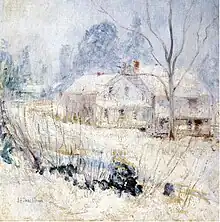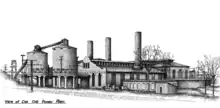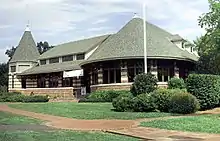Cos Cob, Connecticut
Cos Cob is a neighborhood and census-designated place in the town of Greenwich, Connecticut.[2] It is located on the Connecticut shoreline in southern Fairfield County. It had a population of 6,873 at the 2020 census.[1]
Cos Cob, Connecticut | |
|---|---|
 Country House in Winter, Cos Cob, by John Henry Twachtman, c. 1901 | |
 Location in Fairfield County and the state of Connecticut. | |
| Coordinates: 41°02′00″N 73°35′58″W | |
| Country | |
| U.S. state | |
| County | Fairfield |
| NECTA | Bridgeport-Stamford-Norwalk |
| Region | Western CT |
| Town | Greenwich |
| Area | |
| • Land | 2.15[1] sq mi (5.57 km2) |
| Population | |
| • Total | 6,873 |
| • Density | 3,193.8/sq mi (1,233.1/km2) |
| Time zone | UTC−5 (Eastern (EST)) |
| • Summer (DST) | UTC−4 (EDT) |
| ZIP Code | 06807 |
| Area code | 203 |
| FIPS code | 17520 |
Cos Cob is located on the western side of the mouth of the Mianus River. The American Impressionist Cos Cob Art Colony flourished in the late 19th and early 20th centuries. An offshoot of the group, the Greenwich Art Society, continues to support local artists in town.
The town of Greenwich is one political and taxing body, but consists of several distinct sections or neighborhoods, such as Banksville, Byram, Cos Cob, Glenville, Mianus, Old Greenwich, Riverside and Greenwich (sometimes referred to as central, or downtown, Greenwich). Of these neighborhoods, three (Cos Cob, Old Greenwich, and Riverside) have separate postal names and ZIP codes. From 1883 to 1885, the official post office name of Cos Cob was Bayport.
In 2015, Forbes ranked Cos Cob the 287th wealthiest place in the US with a median house sale price of $1,329,107.[3]
History



The term "Cos Cob" comes from the Coe family that settled in the area in 1641. During their time, a wall (also known as a "cob") was built on the shoreline by Robert Coe to protect the land he gave to his brother. Henceforth, the place was known as Coe's Cob, later becoming Cos Cob.[4]
The community is situated on Cos Cob Harbor, a sheltered area on the north side of Long Island Sound. Cos Cob's role as a commercial shipping port, supplying potatoes and apples to New York City, disappeared with the appearance of the railroad and damming of the Mianus River. The river is now one source of the town's drinking water.
From 1883 to 1885, the official post office name of Cos Cob was Bayport.[5][6]
Train station and bridge

The Cos Cob train station and the Mianus River Railroad Bridge are listed on the National Register of Historic Places.
"On Christmas Day, 1848, the last rails were laid over the Cos Cob Bridge, thereby supplying the last link needed to complete the railroad from New Haven to New York," according to the Stamford Historical Society Web site. "The first trial run was made on that day."[7]
Editors of two Stamford newspapers reported on the event. William H. Holly, Esq., founder of the Stamford Sentinel and a guest on the first trial run, wrote: "The train had to remain at Cos Cob Bridge some three hours for the last rails to be laid over it and the delay gave ample opportunity to the people to come and witness the wonderful feat. The general impression among them seemed to be, that the first train that attempted to cross this pass would also be the last."[7]
Edgar Hoyt, editor of the Stamford Advocate, wrote: "The citizens of the village as well as the horses, cattle, etc., were nearly frightened out of their propriety ... by such a horrible scream as was never heard to issue from any other than a metallic throat. Animals of every description went careening round the fields, snuffling the air in their terror."[7]
Twentieth and twenty-first centuries

The coal-fired steam turbine Cos Cob Power Plant built by Westinghouse in 1907 was a Mission Style structure. It was designated a Historic Mechanical Engineering Landmark in 1982 by the ASME and the IEEE. Despite being listed on the National Register of Historic Places and local and national debate, the plant was decommissioned in 1987 and demolished in 2001.
Ernest Thompson Seton lived in Cos Cob on an estate which is now a town park. Over 75 years ago what would eventually become the Boy Scouts of America was in part founded by him here.
On June 28, 1983, a 100-foot (30 m) elevated portion of Interstate 95 (the Mianus River Bridge) collapsed, killing and injuring several motorists. Interstate 95 is the principal highway between Maine and Florida, and one of the most heavily traveled roads in the country. Because the road was not fully reopened for six months, it created a bottleneck which affected the New York to Boston transportation corridor.
In 2006 NRG Energy Inc. of La Jolla, California, proposed adding additional capacity of 40 megawatts to the current 60 megawatt plant to supplement Connecticut Light and Power during peak periods in southwestern Fairfield County. Two additional jet turbines would be added to the existing plant in 2008.[8]
Notable people
- Edwin Booth, brother of John Wilkes Booth and a famous actor of his day[9]
- Mary McVicker Booth, actress
- Orestes H. Caldwell, one of the first members of the Federal Radio Commission
- Gary Dell'Abate, producer for The Howard Stern Show
- Jim Himes, Democratic congressman from Connecticut's 4th congressional district.
- Finn Murphy, author of The Long Haul
- Barbara O'Neil, actress
- Anya Seton, author of historical fiction
- Jerry Springer, TV show host, The Jerry Springer Show
- Barbara Tuchman, historian[10]
- Frederick M. Warburg, investment banker
Places of interest

- Bush-Holley House, the only National Historic Landmark in Greenwich; built in about 1730; listed in 1988
- Ernest Thompson Seton House
In addition to the Bush-Holley House, these sites in Cos Cob are listed by the National Register of Historic Places:
- Mianus River Railroad Bridge, built: 1904; listed: 1987
- Cos Cob Railroad Station, built: c. 1890; listed: 1989
- Strickland Road Historic District, Strickland Road; built: c. 1730–1938; listed: 1990
- Cos Cob Power Station, Sound Shore Drive; built: 1907; listed: 1990; demolished, 2000
Community facilities
- The Cos Cob Library is a cultural center and community hub providing art gallery space, concert and lecture series, and free Wi-Fi access. Although of recent construction, the building evokes Richardsonian Romanesque design and is set in a pocket park landscaped by local volunteers.
- The neighborhood's ZIP Code is 06807. It has one post office.
- There are two public schools in Cos Cob: Cos Cob Elementary School, 390 pupils, and Central Middle School, 710 pupils (both as of 2010),[11] though school boundaries cut across zip code boundaries and many students who live in Cos Cob attend other public schools in town.
- Cos Cob has a fire department staffed by both full-time salaried firefighters and volunteers.
- Cos Cob station is served by the New Haven Line of the Metro-North Railroad, a commuter rail service that runs between New Haven, Connecticut and New York City.
In popular culture
- In Season 5 of AMC's TV series Mad Men, Cos Cob became the home to character Pete Campbell and his family.[12]
- Gene Marshall, a doll designed by artist Mel Odom Hollywood Golden Age film star, spent her formative years in Cos Cob.
Citations
- "QuickFacts: Cos Cob CDP, Connecticut". United States Census Bureau. Retrieved August 7, 2023.
- U.S. Geological Survey Geographic Names Information System: Cos Cob, Connecticut
- Schiffman, Betsy. "Full List: America's Most Expensive ZIP Codes 2015". forbes.com. Retrieved April 19, 2018.
- Cos Cob CT: A Quaint, Quirky, and Charming Town
- Connecticut Post Office Operations, Connecticut Post Office files
- Connecticut State Register and Manual, 1913 edition, p. 585.
- Web page titled "Murals: Scenes from Yesteryear" on the web site of the Stamford Historical Society. Accessed 25 August 2006.
- "Firm unveils plan to boost electric capacity: Proposal includes upgrades in Norwalk, Greenwich," by Kenneth R. Gosselin for the Hartford Courant, printed June 22, 2006 in the Stamford Advocate, page A6.
- Parry, Wynne, "Vaudeville and Beyond: Before the heyday of movies and television, stages offered a cavalcade of acts", article, The Advocate of Stamford, Connecticut, December 24, 2007, pp. 1, A4, Norwalk and Stamford editions
- Her residence in Cos Cob is noted on the dust jacket of her book, A Distant Mirror.
- Web page titled "Greenwich Public Schools" on the web site of the Greenwich Public Schools. Accessed 7 September 2010.
- Mad Men ep. 5x05 "Signal 30"
General and cited references
- Charles, Eleanor (September 22, 2002). "A Quiet Villagelike Section of Greenwich". The New York Times.
- Gray, Christopher (March 5, 1989). "The Cos Cob Power Plant; The Preservationists Seem to Be Running Out of Steam". The New York Times.
- Larkin, Susan G. (2001). The Cos Cob Art Colony: Impressionists on the Connecticut Shore. Yale University Press.
- Nguyen, H. (June 22, 2006). "Cos Cob power plant scheduled for upgrade". Greenwich Time. p. A1.
